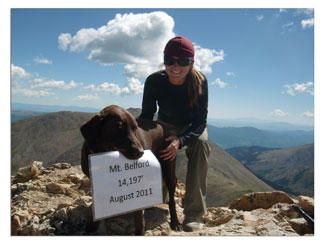
Crimes of dispassion
When Milton wrote, “Heaven, the seat of bliss, brooks not the works of violence and war,” I cannot help but think of my home town, for it is so Edenic and removed from the harsh realities that exist in much of the world that I often feel the need to leave and explore.

I’m guilty of a selfish, heinous crime: I often take my life for granted. There are some days, when I look at mountains so familiar, it’s like watching the end of an over-played movie on TV. The final scene of “A Few Good Men” used to be moving, but Jack Nicholson’s speech is censored and Tom Cruise is less charming now that we know he’s a Scientologist.
These mountains, the verdant valleys and far off snow-capped summits, are beautiful in their familiarity. But my sense of wonder often grows stale in the face of wander-lust. I become convinced that there are other beautiful, friendly, safe towns out in the wide, wild world. I was born in Durango, after all, there has to be more, but I haven’t found it yet.
To cure my wanderlust, I try to travel, to see things that surprise me, impress me, challenge me, scare me. I try to exchange the comfort of paradise for the discomfort of adventure. This year, I may or may not have gone to an island in the Caribbean that is off limits to most Americans—in fact, I may or may not be writing from the aforementioned forbidden destination. This country will most likely open up to more tourism with the death of a certain bearded political figure, but currently, were I to be there, I would be guilty of a federal offense.
So, exchanging one crime for another, I must confess that I miss Colorado. Flipping through the vacation pictures, past beaches and colonial stone Iglesias, past the malecón at sunset and a lighthouse on a cliff, are pictures from last summer when Boyfriend and I backpacked across Colorado for 21 days. I am especially fascinated with pictures of mountains in every direction – a pass we had crossed the day before, the view from 14,321 feet, and looking south to what we will summit the next day.
As I sit in a café drinking daiquiris like Hemingway, in a city that feels more like a Bikram yoga studio than a Caribbean harbor, and isolated by my linguistic incompetence, I feel the desired discomfort of travel. (This is more likely due to the heat/humidity, because I can’t stop sweating and my only chance at rehydration is the ice in the daiquiri—uno más, por favor!)
Looking at pictures from the previous year, I envy the girl smiling back in a rain jacket and long hiking pants (she actually looks cold!) she has her dog with her, a tired, happy Labrador, and a scruffy boyfriend. I remember how exhausted we were, how bad we smelled, and how good it felt to “shower” in snow-melt creeks at 10,000 feet. To pass the time, we played memory games and somehow Taylor Swift and her catchy lyrics followed us along the trail, playing on repeat in my mind until I began to sing along to scare off potential predators. (The lack of cougar and bear encounters are proof that she’s talented in her own way and so am I.)
I think about the short time I have left in this Caribbean hot box and remember a line from Milton’s Paradise Lost: “Short retirement urges sweet return.” This was uttered by Adam, asking Eve for a little space, he just wanted to bro-down, and as we all know, this is when the snake found her.
As my daiquiri-soaked thoughts come through and mix with Miltonic theory, I wonder at the idea of paradise. Can it ever be found, or is it intrinsically lost?
Many islands in the Caribbean rely on a tourism industry that revolves around the idea of paradise—but this heavenly fabrication is more akin to Disney Land than to natural beauty. Resorts rely on control and isolation and even the beaches where the cruise ships dock tend to be rented out, cleaned up and forbidden from the outside. There is poverty, but it’s usually either hidden or exploited. There’s garbage, stray dogs and feces, but not in the tourist part of town.
My Caribe adventure was filled with hostels, buses, crowded beaches and locals. I avoided the façade, but my travels reminded me that my paradise is in the valleys, it’s by the river, it’s in the afternoon thunder, and it’s in walking up a mountain not down the beach. I’m loving my vacation, but I’m eager for home—and with my unsettled desire comes an unsettled thought that I’m just so contrary that I desire to be wherever I am not.
Adam and Eve ate the fruit of the Tree of Knowledge of Good and Evil, with it they gained consciousness and were banished from Eden. Only in their exile did they become aware of their heavenly home to which they could not return. Am I similarly cursed to only appreciate my home through absence?
I know, even though I’m not yet on the plane descending through mountains, how it will feel to come home. I know that I will revel in the sight of familiar mountains, trying to find lakes, rivers, peaks and towns from above. I know that the mountains are like a jagged security blanket that holds me tight against the outside world.
Coming home to work and dog and routine is not the real world: it is safe and beautiful and relaxing. The outside is real, with real problems such as disease, poverty and totalitarian regimes. For my crime of dispassion, I’m paying the price of being homesick. It’s a short sentence, but I’ll try not to forget the lessons I’ve learned when I return to Eden.
– Maggie Casey
